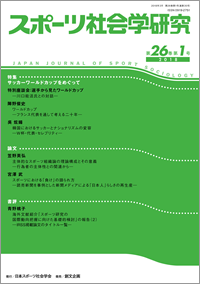Volume 26, Issue 1
FIFA World Cup
Displaying 1-5 of 5 articles from this issue
- |<
- <
- 1
- >
- >|
Introduction
-
2018Volume 26Issue 1 Pages 3-4
Published: March 30, 2018
Released on J-STAGE: March 30, 2019
Download PDF (565K) -
2018Volume 26Issue 1 Pages 15-28
Published: March 30, 2018
Released on J-STAGE: March 30, 2019
Download PDF (996K) -
2018Volume 26Issue 1 Pages 29-41
Published: March 30, 2018
Released on J-STAGE: March 30, 2019
Download PDF (899K)
-
2018Volume 26Issue 1 Pages 43-58
Published: March 30, 2018
Released on J-STAGE: April 06, 2018
Advance online publication: November 30, 2017Download PDF (1212K) -
2018Volume 26Issue 1 Pages 59-74
Published: March 30, 2018
Released on J-STAGE: April 06, 2018
Advance online publication: January 30, 2018Download PDF (1126K)
- |<
- <
- 1
- >
- >|
